Accounting Ethics and Professional Conduct: A Comprehensive Analysis
VerifiedAdded on 2020/04/07
|13
|2101
|510
Homework Assignment
AI Summary
This accounting assignment delves into the ethical considerations within financial reporting, examining a scenario involving potential misrepresentation of financial statements. The assignment identifies key stakeholders, including employees, government, and auditors, and analyzes the motivations behind potential unethical actions, such as deferring profits to obtain grants and bonuses. It explores the ethical issues of fraudulent reporting and omission of financial records, emphasizing the importance of adhering to generally accepted accounting standards. The assignment also includes journal entries and a trial balance, followed by case studies of disciplinary actions taken against accountants who violated ethical codes, and the penalties imposed. The document references APES 110 standards, discussing responsibilities, confidentiality, and the general rules of ethics, and concludes with an assessment of the sufficiency of penalties and costs in the cases presented. The assignment provides a comprehensive overview of ethical challenges in the accounting profession and the consequences of unethical behavior.
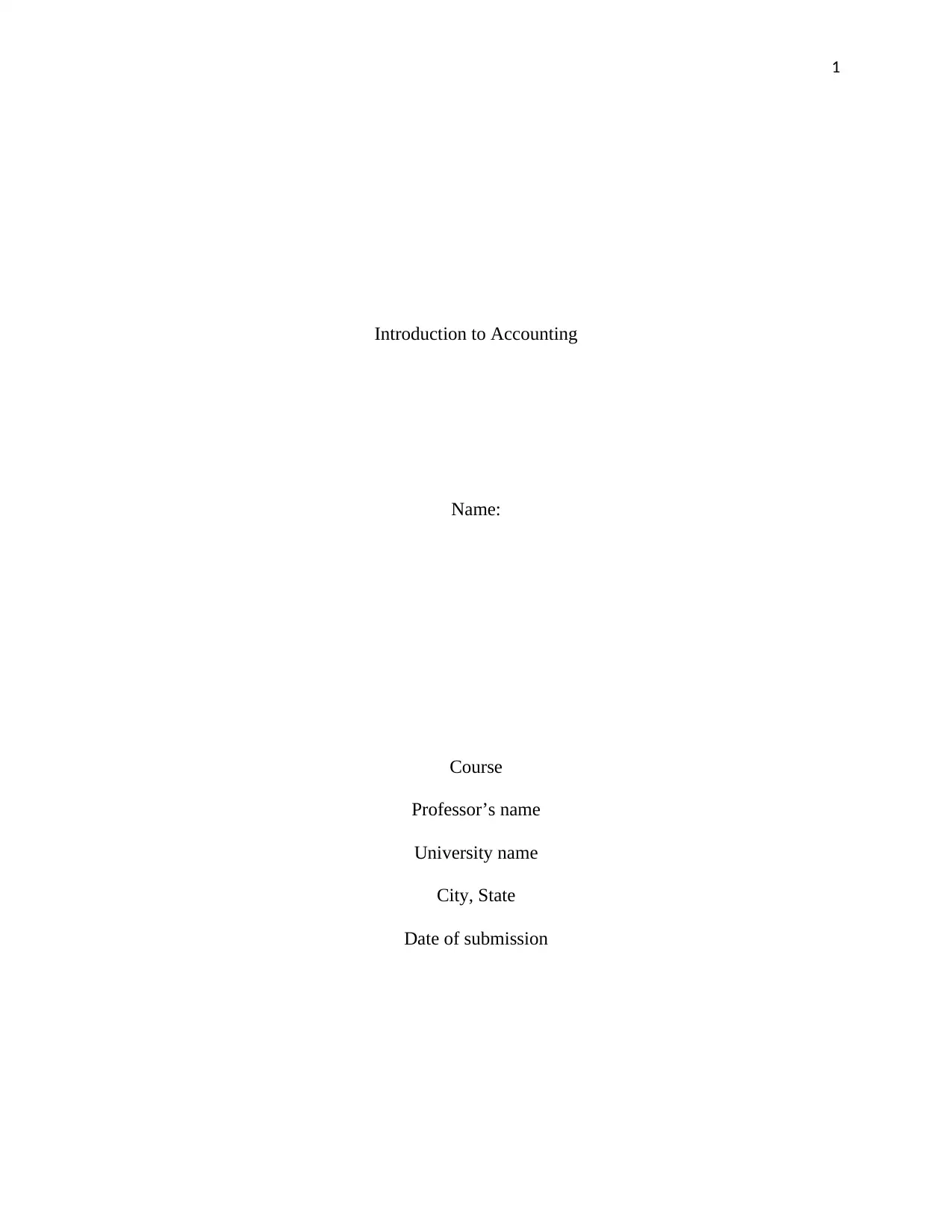
1
Introduction to Accounting
Name:
Course
Professor’s name
University name
City, State
Date of submission
Introduction to Accounting
Name:
Course
Professor’s name
University name
City, State
Date of submission
Paraphrase This Document
Need a fresh take? Get an instant paraphrase of this document with our AI Paraphraser
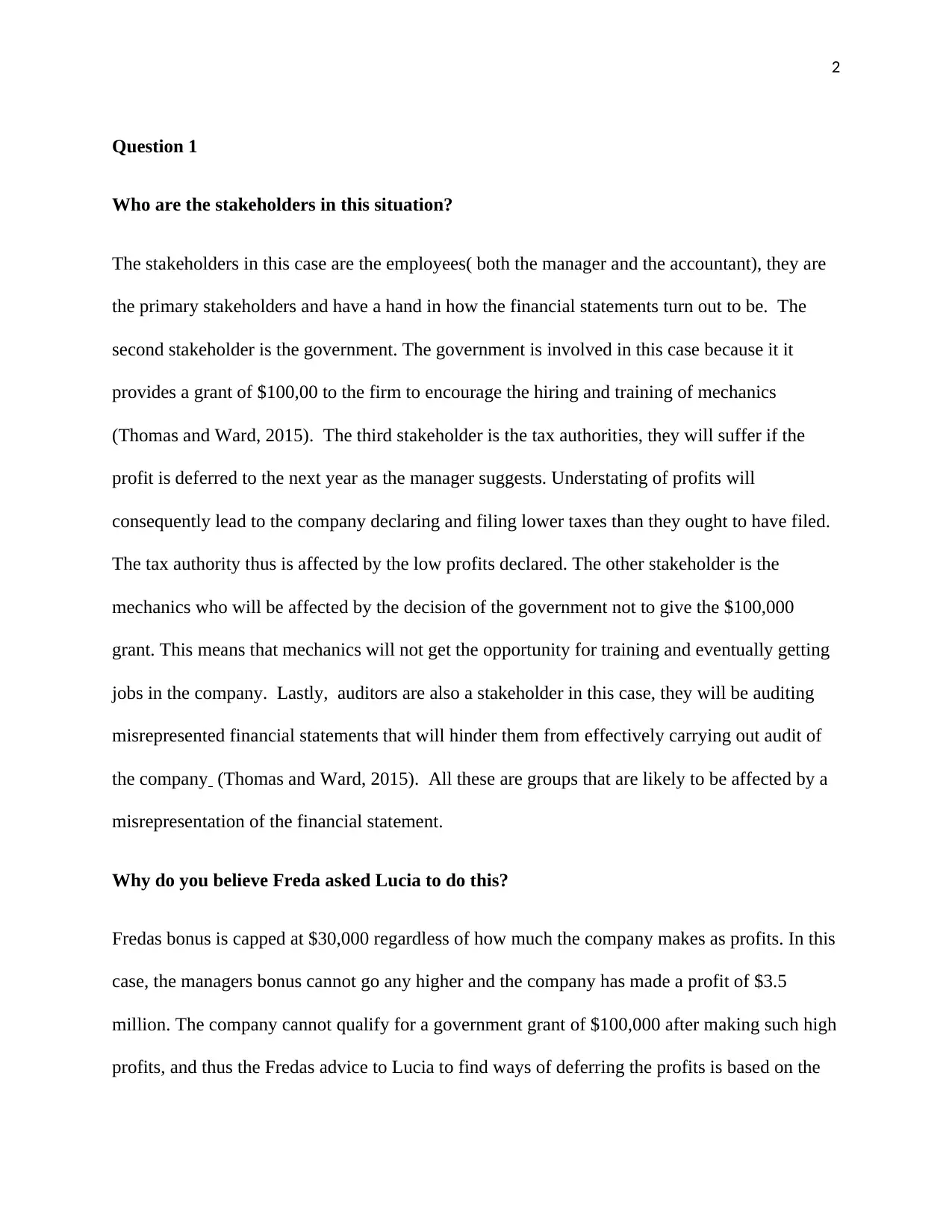
2
Question 1
Who are the stakeholders in this situation?
The stakeholders in this case are the employees( both the manager and the accountant), they are
the primary stakeholders and have a hand in how the financial statements turn out to be. The
second stakeholder is the government. The government is involved in this case because it it
provides a grant of $100,00 to the firm to encourage the hiring and training of mechanics
(Thomas and Ward, 2015). The third stakeholder is the tax authorities, they will suffer if the
profit is deferred to the next year as the manager suggests. Understating of profits will
consequently lead to the company declaring and filing lower taxes than they ought to have filed.
The tax authority thus is affected by the low profits declared. The other stakeholder is the
mechanics who will be affected by the decision of the government not to give the $100,000
grant. This means that mechanics will not get the opportunity for training and eventually getting
jobs in the company. Lastly, auditors are also a stakeholder in this case, they will be auditing
misrepresented financial statements that will hinder them from effectively carrying out audit of
the company (Thomas and Ward, 2015). All these are groups that are likely to be affected by a
misrepresentation of the financial statement.
Why do you believe Freda asked Lucia to do this?
Fredas bonus is capped at $30,000 regardless of how much the company makes as profits. In this
case, the managers bonus cannot go any higher and the company has made a profit of $3.5
million. The company cannot qualify for a government grant of $100,000 after making such high
profits, and thus the Fredas advice to Lucia to find ways of deferring the profits is based on the
Question 1
Who are the stakeholders in this situation?
The stakeholders in this case are the employees( both the manager and the accountant), they are
the primary stakeholders and have a hand in how the financial statements turn out to be. The
second stakeholder is the government. The government is involved in this case because it it
provides a grant of $100,00 to the firm to encourage the hiring and training of mechanics
(Thomas and Ward, 2015). The third stakeholder is the tax authorities, they will suffer if the
profit is deferred to the next year as the manager suggests. Understating of profits will
consequently lead to the company declaring and filing lower taxes than they ought to have filed.
The tax authority thus is affected by the low profits declared. The other stakeholder is the
mechanics who will be affected by the decision of the government not to give the $100,000
grant. This means that mechanics will not get the opportunity for training and eventually getting
jobs in the company. Lastly, auditors are also a stakeholder in this case, they will be auditing
misrepresented financial statements that will hinder them from effectively carrying out audit of
the company (Thomas and Ward, 2015). All these are groups that are likely to be affected by a
misrepresentation of the financial statement.
Why do you believe Freda asked Lucia to do this?
Fredas bonus is capped at $30,000 regardless of how much the company makes as profits. In this
case, the managers bonus cannot go any higher and the company has made a profit of $3.5
million. The company cannot qualify for a government grant of $100,000 after making such high
profits, and thus the Fredas advice to Lucia to find ways of deferring the profits is based on the
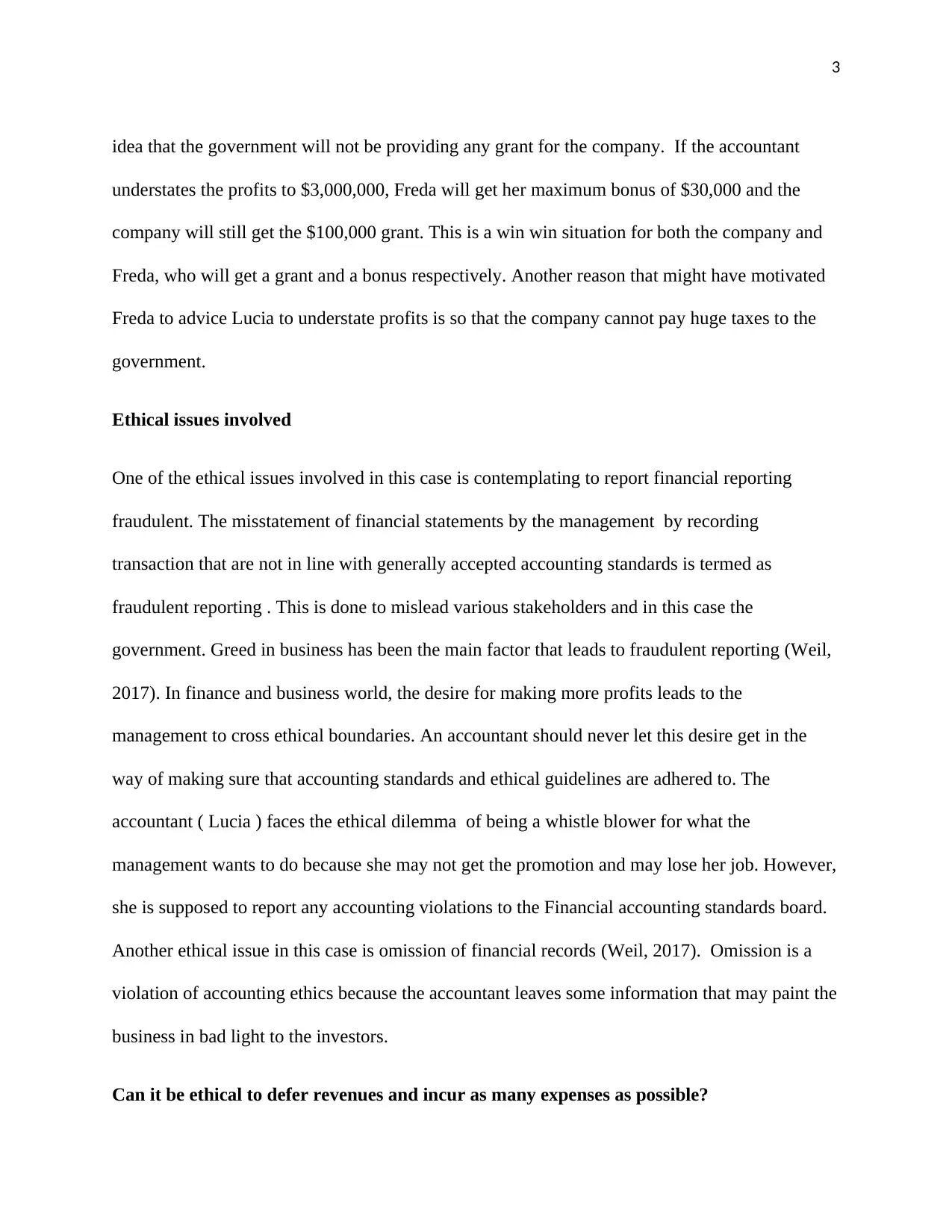
3
idea that the government will not be providing any grant for the company. If the accountant
understates the profits to $3,000,000, Freda will get her maximum bonus of $30,000 and the
company will still get the $100,000 grant. This is a win win situation for both the company and
Freda, who will get a grant and a bonus respectively. Another reason that might have motivated
Freda to advice Lucia to understate profits is so that the company cannot pay huge taxes to the
government.
Ethical issues involved
One of the ethical issues involved in this case is contemplating to report financial reporting
fraudulent. The misstatement of financial statements by the management by recording
transaction that are not in line with generally accepted accounting standards is termed as
fraudulent reporting . This is done to mislead various stakeholders and in this case the
government. Greed in business has been the main factor that leads to fraudulent reporting (Weil,
2017). In finance and business world, the desire for making more profits leads to the
management to cross ethical boundaries. An accountant should never let this desire get in the
way of making sure that accounting standards and ethical guidelines are adhered to. The
accountant ( Lucia ) faces the ethical dilemma of being a whistle blower for what the
management wants to do because she may not get the promotion and may lose her job. However,
she is supposed to report any accounting violations to the Financial accounting standards board.
Another ethical issue in this case is omission of financial records (Weil, 2017). Omission is a
violation of accounting ethics because the accountant leaves some information that may paint the
business in bad light to the investors.
Can it be ethical to defer revenues and incur as many expenses as possible?
idea that the government will not be providing any grant for the company. If the accountant
understates the profits to $3,000,000, Freda will get her maximum bonus of $30,000 and the
company will still get the $100,000 grant. This is a win win situation for both the company and
Freda, who will get a grant and a bonus respectively. Another reason that might have motivated
Freda to advice Lucia to understate profits is so that the company cannot pay huge taxes to the
government.
Ethical issues involved
One of the ethical issues involved in this case is contemplating to report financial reporting
fraudulent. The misstatement of financial statements by the management by recording
transaction that are not in line with generally accepted accounting standards is termed as
fraudulent reporting . This is done to mislead various stakeholders and in this case the
government. Greed in business has been the main factor that leads to fraudulent reporting (Weil,
2017). In finance and business world, the desire for making more profits leads to the
management to cross ethical boundaries. An accountant should never let this desire get in the
way of making sure that accounting standards and ethical guidelines are adhered to. The
accountant ( Lucia ) faces the ethical dilemma of being a whistle blower for what the
management wants to do because she may not get the promotion and may lose her job. However,
she is supposed to report any accounting violations to the Financial accounting standards board.
Another ethical issue in this case is omission of financial records (Weil, 2017). Omission is a
violation of accounting ethics because the accountant leaves some information that may paint the
business in bad light to the investors.
Can it be ethical to defer revenues and incur as many expenses as possible?
⊘ This is a preview!⊘
Do you want full access?
Subscribe today to unlock all pages.

Trusted by 1+ million students worldwide
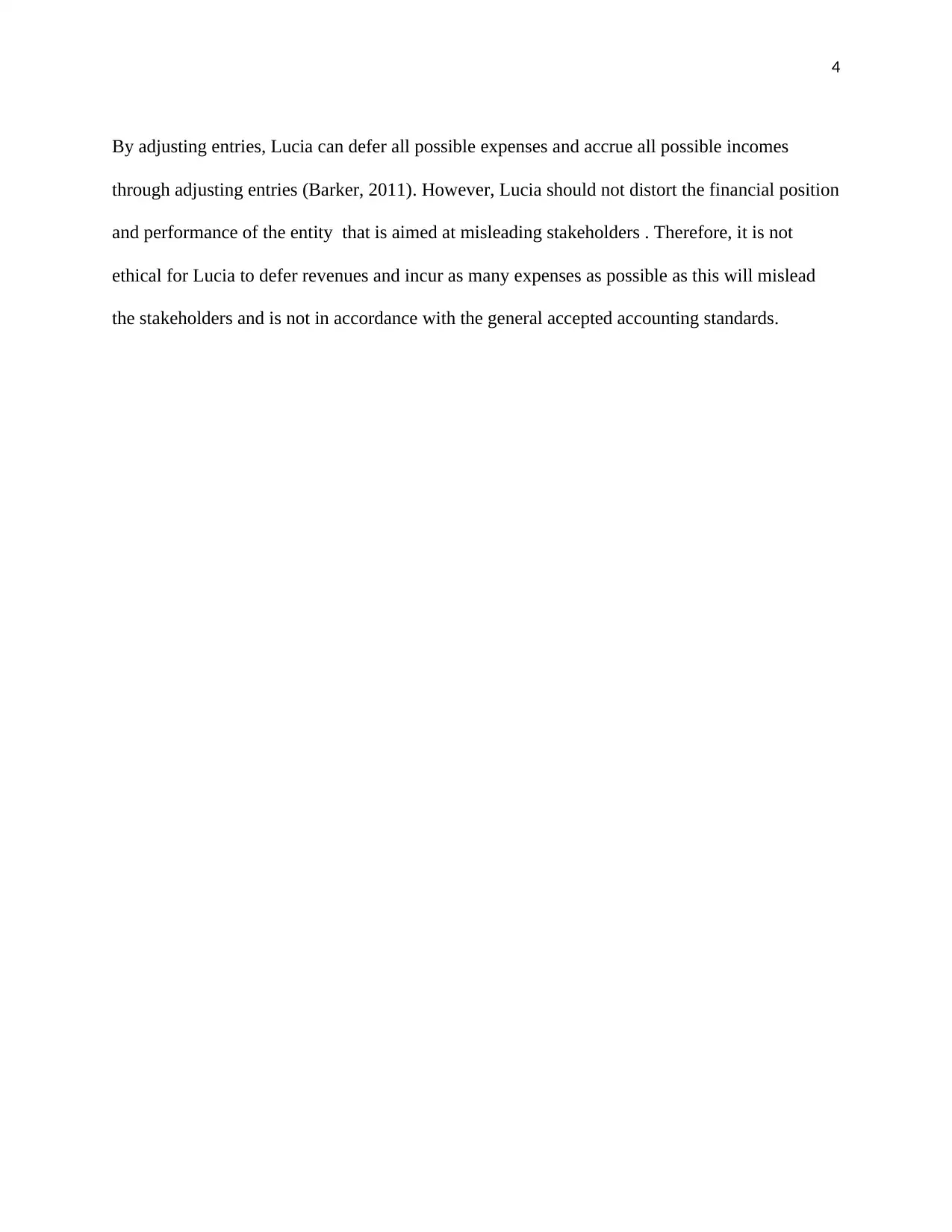
4
By adjusting entries, Lucia can defer all possible expenses and accrue all possible incomes
through adjusting entries (Barker, 2011). However, Lucia should not distort the financial position
and performance of the entity that is aimed at misleading stakeholders . Therefore, it is not
ethical for Lucia to defer revenues and incur as many expenses as possible as this will mislead
the stakeholders and is not in accordance with the general accepted accounting standards.
By adjusting entries, Lucia can defer all possible expenses and accrue all possible incomes
through adjusting entries (Barker, 2011). However, Lucia should not distort the financial position
and performance of the entity that is aimed at misleading stakeholders . Therefore, it is not
ethical for Lucia to defer revenues and incur as many expenses as possible as this will mislead
the stakeholders and is not in accordance with the general accepted accounting standards.
Paraphrase This Document
Need a fresh take? Get an instant paraphrase of this document with our AI Paraphraser
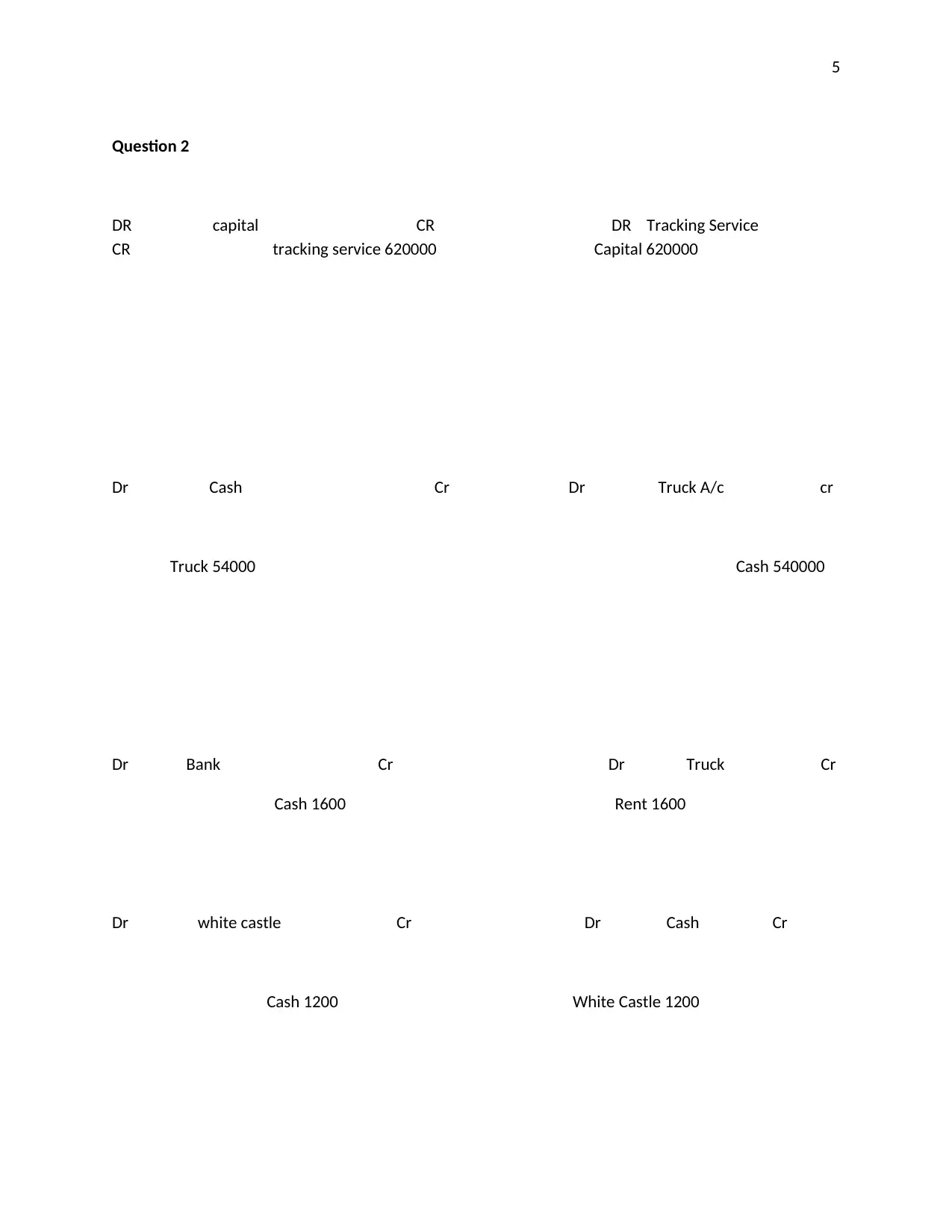
5
Question 2
DR capital CR DR Tracking Service
CR tracking service 620000 Capital 620000
Dr Cash Cr Dr Truck A/c cr
Truck 54000 Cash 540000
Dr Bank Cr Dr Truck Cr
Cash 1600 Rent 1600
Dr white castle Cr Dr Cash Cr
Cash 1200 White Castle 1200
Question 2
DR capital CR DR Tracking Service
CR tracking service 620000 Capital 620000
Dr Cash Cr Dr Truck A/c cr
Truck 54000 Cash 540000
Dr Bank Cr Dr Truck Cr
Cash 1600 Rent 1600
Dr white castle Cr Dr Cash Cr
Cash 1200 White Castle 1200

6
Dr Dienhoff ac Cr Dr Cash Cr
Cash
1200 Dien 12000
Dr Advertising Cr Dr Cash Cr
Adv 1200 Ad 1200
Dr
Outback Cr Dr Cash Cr
Cash 6200 Trucking serv 6200
Dr
Star/ Herdie Cr Dr Cash Cr
Star 9600 star/ herdie 18600
Hardie 9000
Dr Fuel Cr Dr Bank Cr
Bank 8800 Fuel 8800 White 12
Dr Dienhoff ac Cr Dr Cash Cr
Cash
1200 Dien 12000
Dr Advertising Cr Dr Cash Cr
Adv 1200 Ad 1200
Dr
Outback Cr Dr Cash Cr
Cash 6200 Trucking serv 6200
Dr
Star/ Herdie Cr Dr Cash Cr
Star 9600 star/ herdie 18600
Hardie 9000
Dr Fuel Cr Dr Bank Cr
Bank 8800 Fuel 8800 White 12
⊘ This is a preview!⊘
Do you want full access?
Subscribe today to unlock all pages.

Trusted by 1+ million students worldwide
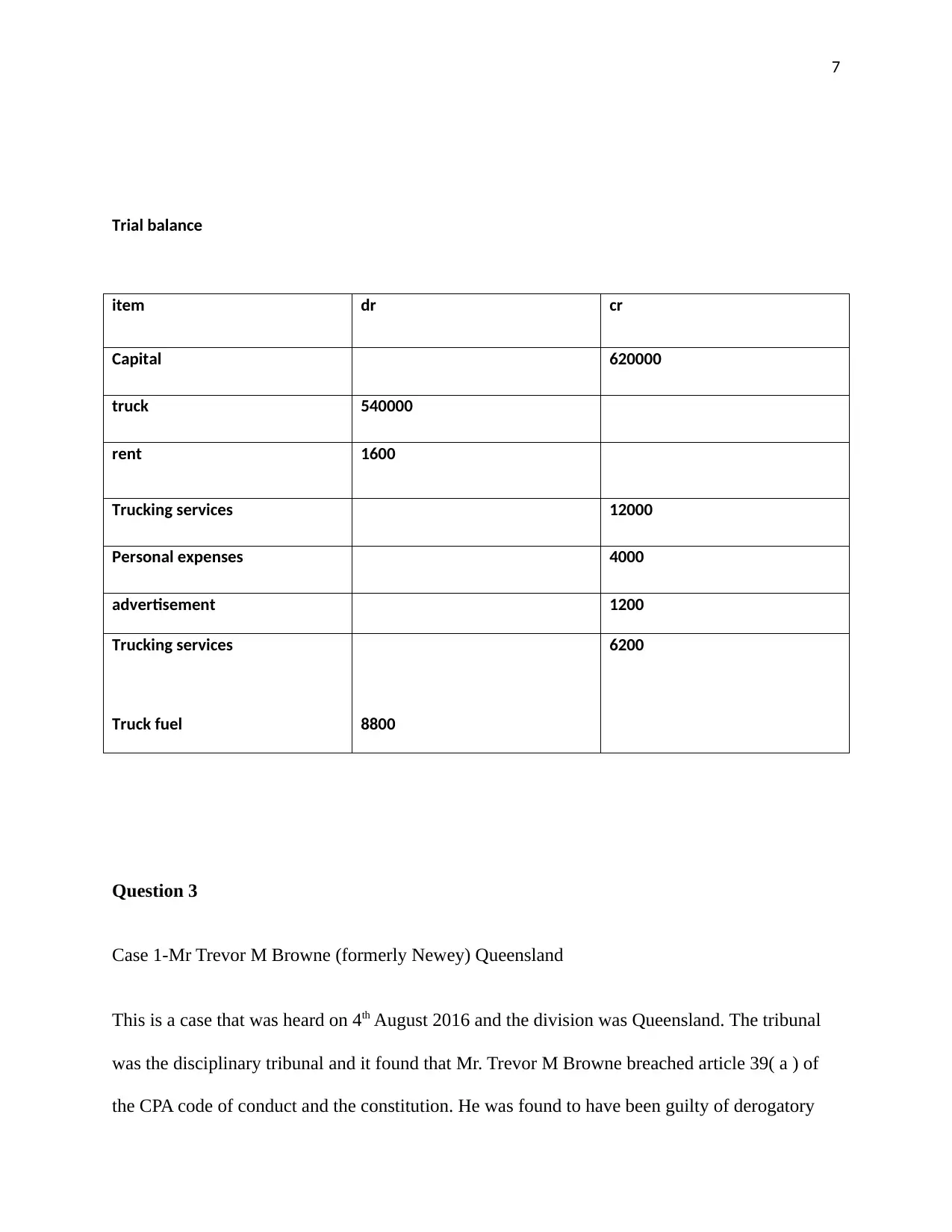
7
Trial balance
item dr cr
Capital 620000
truck 540000
rent 1600
Trucking services 12000
Personal expenses 4000
advertisement 1200
Trucking services
Truck fuel 8800
6200
Question 3
Case 1-Mr Trevor M Browne (formerly Newey) Queensland
This is a case that was heard on 4th August 2016 and the division was Queensland. The tribunal
was the disciplinary tribunal and it found that Mr. Trevor M Browne breached article 39( a ) of
the CPA code of conduct and the constitution. He was found to have been guilty of derogatory
Trial balance
item dr cr
Capital 620000
truck 540000
rent 1600
Trucking services 12000
Personal expenses 4000
advertisement 1200
Trucking services
Truck fuel 8800
6200
Question 3
Case 1-Mr Trevor M Browne (formerly Newey) Queensland
This is a case that was heard on 4th August 2016 and the division was Queensland. The tribunal
was the disciplinary tribunal and it found that Mr. Trevor M Browne breached article 39( a ) of
the CPA code of conduct and the constitution. He was found to have been guilty of derogatory
Paraphrase This Document
Need a fresh take? Get an instant paraphrase of this document with our AI Paraphraser
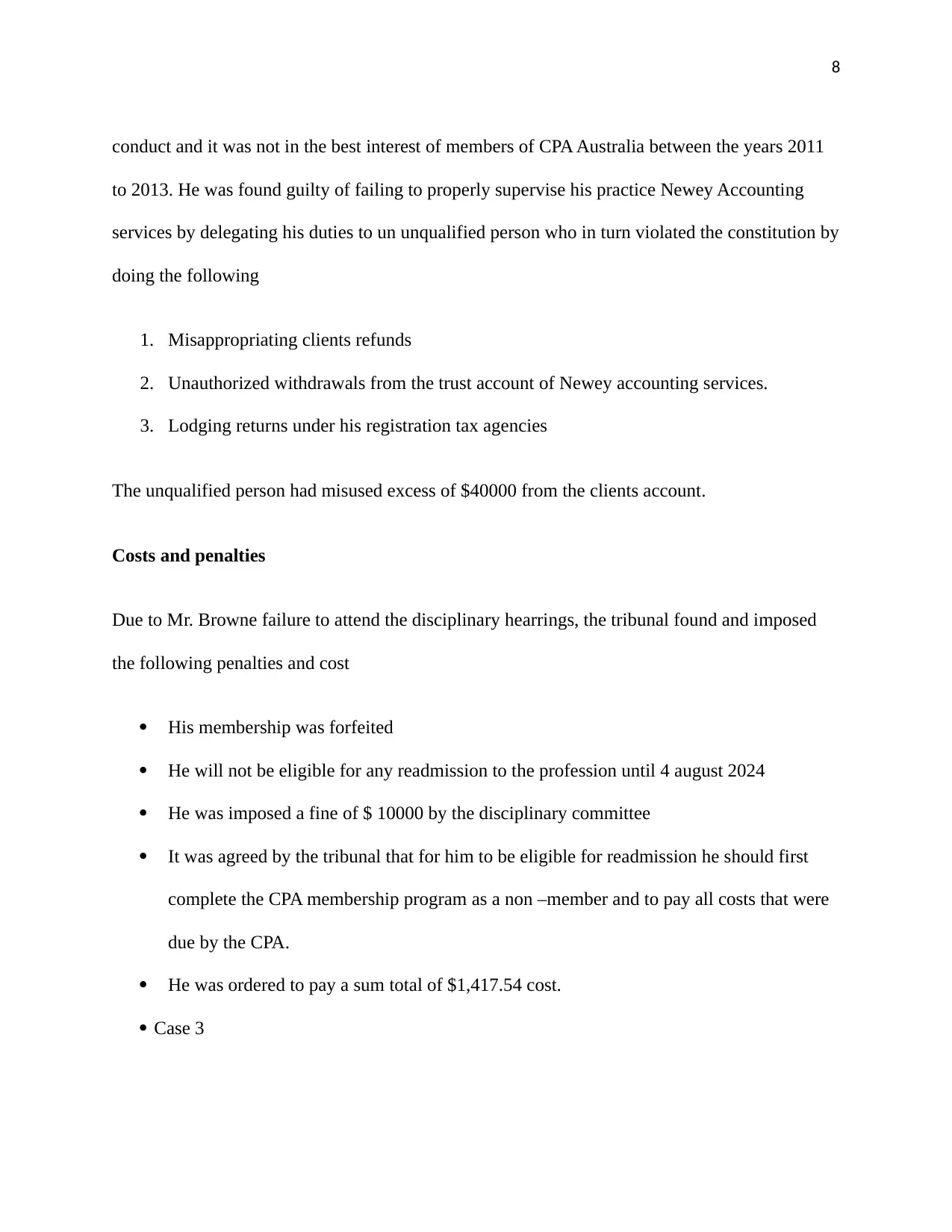
8
conduct and it was not in the best interest of members of CPA Australia between the years 2011
to 2013. He was found guilty of failing to properly supervise his practice Newey Accounting
services by delegating his duties to un unqualified person who in turn violated the constitution by
doing the following
1. Misappropriating clients refunds
2. Unauthorized withdrawals from the trust account of Newey accounting services.
3. Lodging returns under his registration tax agencies
The unqualified person had misused excess of $40000 from the clients account.
Costs and penalties
Due to Mr. Browne failure to attend the disciplinary hearrings, the tribunal found and imposed
the following penalties and cost
His membership was forfeited
He will not be eligible for any readmission to the profession until 4 august 2024
He was imposed a fine of $ 10000 by the disciplinary committee
It was agreed by the tribunal that for him to be eligible for readmission he should first
complete the CPA membership program as a non –member and to pay all costs that were
due by the CPA.
He was ordered to pay a sum total of $1,417.54 cost.
Case 3
conduct and it was not in the best interest of members of CPA Australia between the years 2011
to 2013. He was found guilty of failing to properly supervise his practice Newey Accounting
services by delegating his duties to un unqualified person who in turn violated the constitution by
doing the following
1. Misappropriating clients refunds
2. Unauthorized withdrawals from the trust account of Newey accounting services.
3. Lodging returns under his registration tax agencies
The unqualified person had misused excess of $40000 from the clients account.
Costs and penalties
Due to Mr. Browne failure to attend the disciplinary hearrings, the tribunal found and imposed
the following penalties and cost
His membership was forfeited
He will not be eligible for any readmission to the profession until 4 august 2024
He was imposed a fine of $ 10000 by the disciplinary committee
It was agreed by the tribunal that for him to be eligible for readmission he should first
complete the CPA membership program as a non –member and to pay all costs that were
due by the CPA.
He was ordered to pay a sum total of $1,417.54 cost.
Case 3
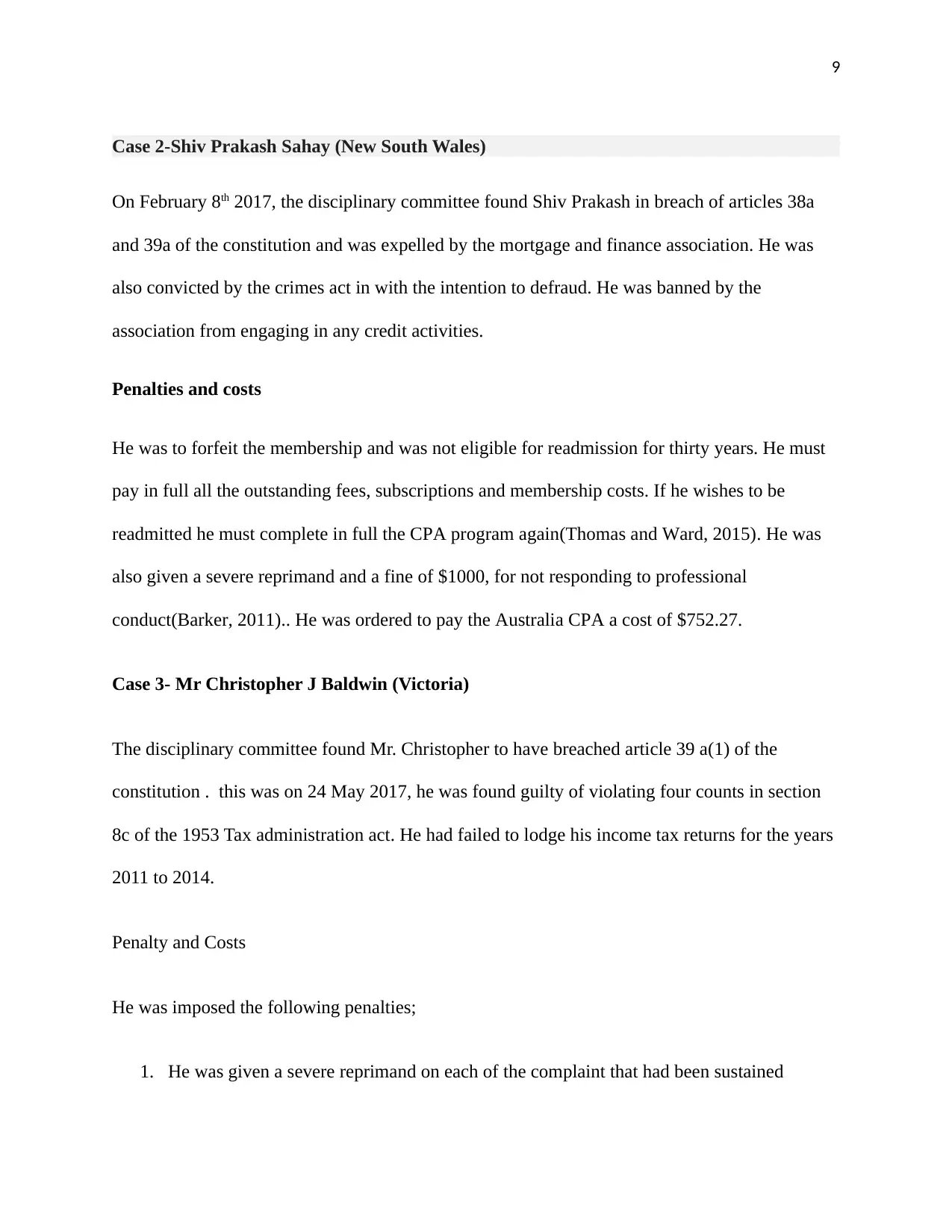
9
Case 2-Shiv Prakash Sahay (New South Wales)
On February 8th 2017, the disciplinary committee found Shiv Prakash in breach of articles 38a
and 39a of the constitution and was expelled by the mortgage and finance association. He was
also convicted by the crimes act in with the intention to defraud. He was banned by the
association from engaging in any credit activities.
Penalties and costs
He was to forfeit the membership and was not eligible for readmission for thirty years. He must
pay in full all the outstanding fees, subscriptions and membership costs. If he wishes to be
readmitted he must complete in full the CPA program again(Thomas and Ward, 2015). He was
also given a severe reprimand and a fine of $1000, for not responding to professional
conduct(Barker, 2011).. He was ordered to pay the Australia CPA a cost of $752.27.
Case 3- Mr Christopher J Baldwin (Victoria)
The disciplinary committee found Mr. Christopher to have breached article 39 a(1) of the
constitution . this was on 24 May 2017, he was found guilty of violating four counts in section
8c of the 1953 Tax administration act. He had failed to lodge his income tax returns for the years
2011 to 2014.
Penalty and Costs
He was imposed the following penalties;
1. He was given a severe reprimand on each of the complaint that had been sustained
Case 2-Shiv Prakash Sahay (New South Wales)
On February 8th 2017, the disciplinary committee found Shiv Prakash in breach of articles 38a
and 39a of the constitution and was expelled by the mortgage and finance association. He was
also convicted by the crimes act in with the intention to defraud. He was banned by the
association from engaging in any credit activities.
Penalties and costs
He was to forfeit the membership and was not eligible for readmission for thirty years. He must
pay in full all the outstanding fees, subscriptions and membership costs. If he wishes to be
readmitted he must complete in full the CPA program again(Thomas and Ward, 2015). He was
also given a severe reprimand and a fine of $1000, for not responding to professional
conduct(Barker, 2011).. He was ordered to pay the Australia CPA a cost of $752.27.
Case 3- Mr Christopher J Baldwin (Victoria)
The disciplinary committee found Mr. Christopher to have breached article 39 a(1) of the
constitution . this was on 24 May 2017, he was found guilty of violating four counts in section
8c of the 1953 Tax administration act. He had failed to lodge his income tax returns for the years
2011 to 2014.
Penalty and Costs
He was imposed the following penalties;
1. He was given a severe reprimand on each of the complaint that had been sustained
⊘ This is a preview!⊘
Do you want full access?
Subscribe today to unlock all pages.

Trusted by 1+ million students worldwide
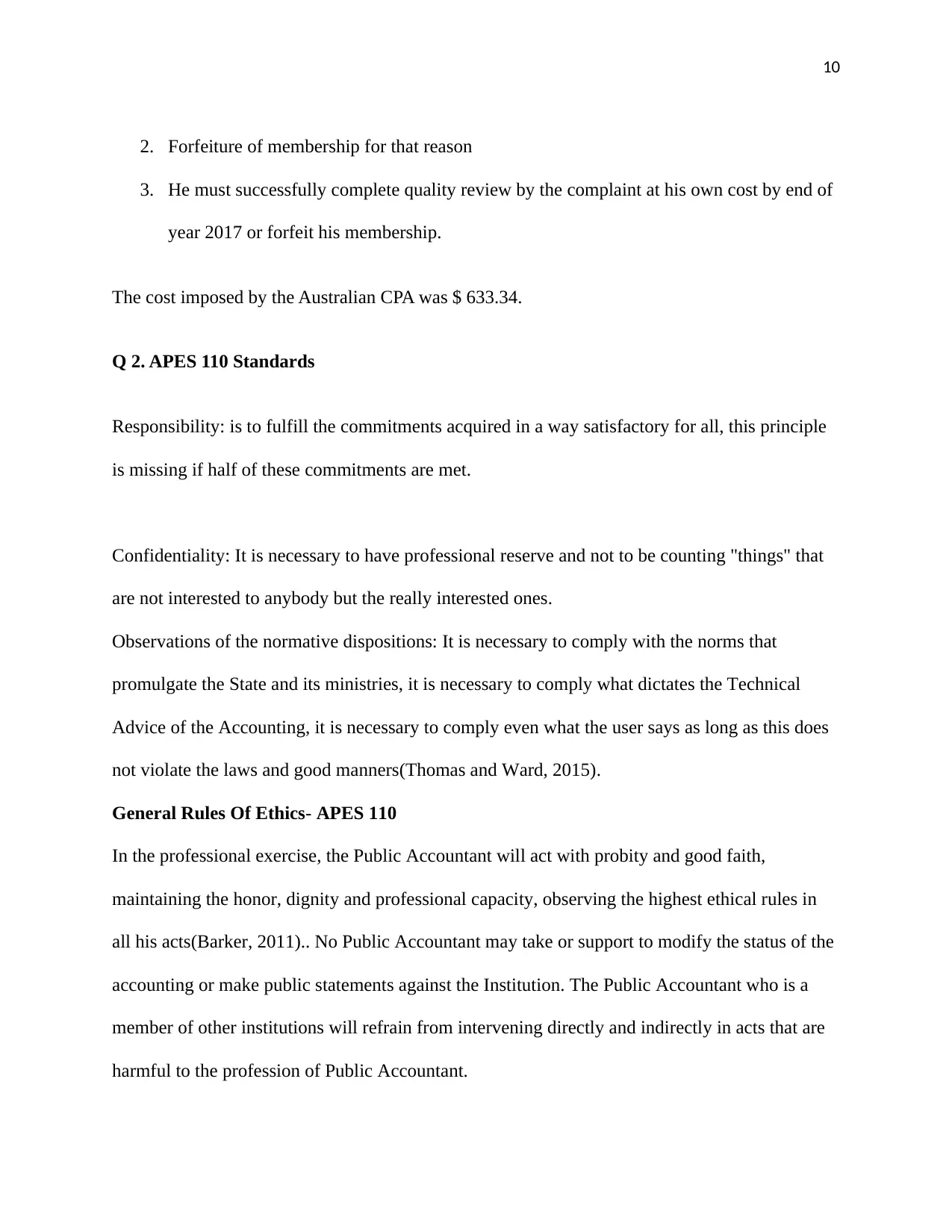
10
2. Forfeiture of membership for that reason
3. He must successfully complete quality review by the complaint at his own cost by end of
year 2017 or forfeit his membership.
The cost imposed by the Australian CPA was $ 633.34.
Q 2. APES 110 Standards
Responsibility: is to fulfill the commitments acquired in a way satisfactory for all, this principle
is missing if half of these commitments are met.
Confidentiality: It is necessary to have professional reserve and not to be counting "things" that
are not interested to anybody but the really interested ones.
Observations of the normative dispositions: It is necessary to comply with the norms that
promulgate the State and its ministries, it is necessary to comply what dictates the Technical
Advice of the Accounting, it is necessary to comply even what the user says as long as this does
not violate the laws and good manners(Thomas and Ward, 2015).
General Rules Of Ethics- APES 110
In the professional exercise, the Public Accountant will act with probity and good faith,
maintaining the honor, dignity and professional capacity, observing the highest ethical rules in
all his acts(Barker, 2011).. No Public Accountant may take or support to modify the status of the
accounting or make public statements against the Institution. The Public Accountant who is a
member of other institutions will refrain from intervening directly and indirectly in acts that are
harmful to the profession of Public Accountant.
2. Forfeiture of membership for that reason
3. He must successfully complete quality review by the complaint at his own cost by end of
year 2017 or forfeit his membership.
The cost imposed by the Australian CPA was $ 633.34.
Q 2. APES 110 Standards
Responsibility: is to fulfill the commitments acquired in a way satisfactory for all, this principle
is missing if half of these commitments are met.
Confidentiality: It is necessary to have professional reserve and not to be counting "things" that
are not interested to anybody but the really interested ones.
Observations of the normative dispositions: It is necessary to comply with the norms that
promulgate the State and its ministries, it is necessary to comply what dictates the Technical
Advice of the Accounting, it is necessary to comply even what the user says as long as this does
not violate the laws and good manners(Thomas and Ward, 2015).
General Rules Of Ethics- APES 110
In the professional exercise, the Public Accountant will act with probity and good faith,
maintaining the honor, dignity and professional capacity, observing the highest ethical rules in
all his acts(Barker, 2011).. No Public Accountant may take or support to modify the status of the
accounting or make public statements against the Institution. The Public Accountant who is a
member of other institutions will refrain from intervening directly and indirectly in acts that are
harmful to the profession of Public Accountant.
Paraphrase This Document
Need a fresh take? Get an instant paraphrase of this document with our AI Paraphraser
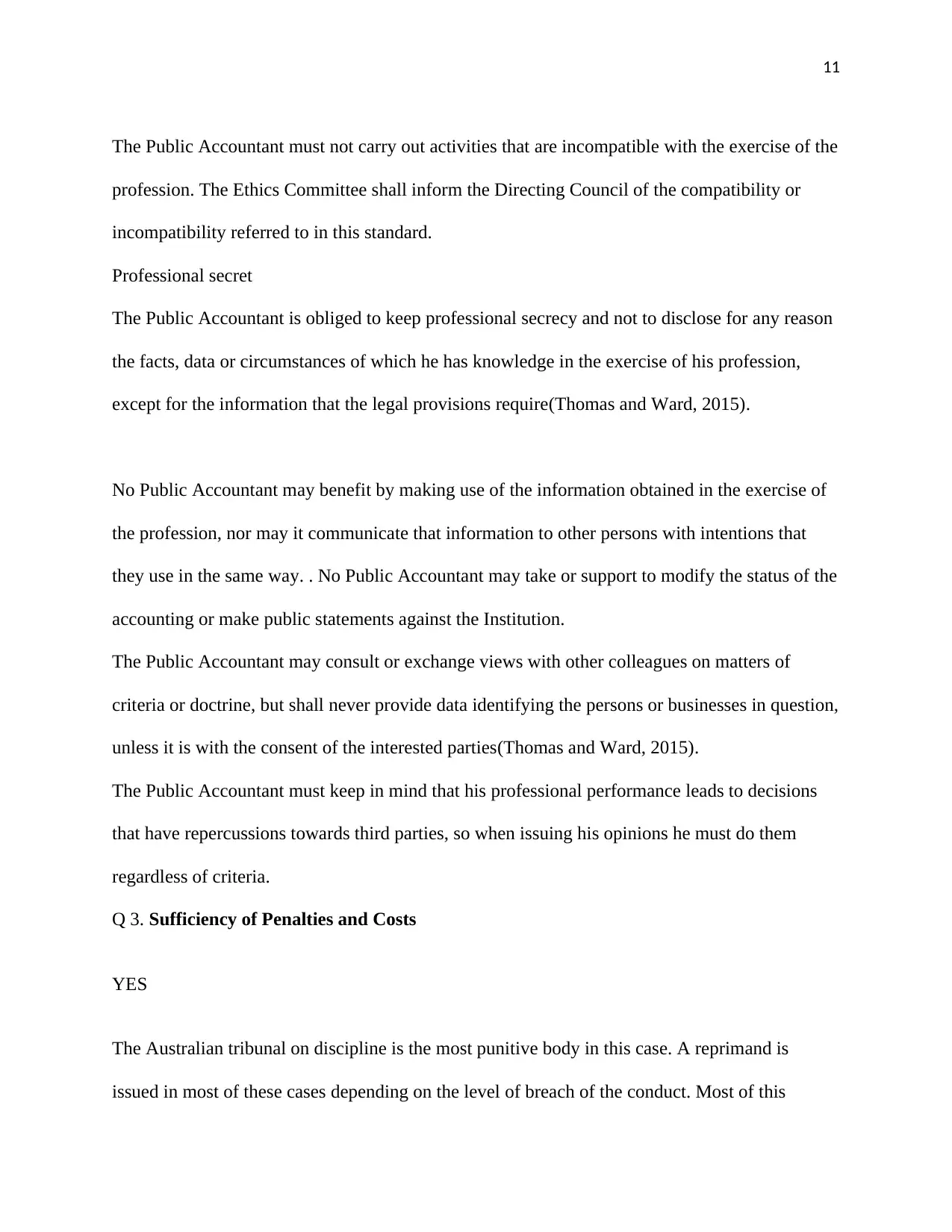
11
The Public Accountant must not carry out activities that are incompatible with the exercise of the
profession. The Ethics Committee shall inform the Directing Council of the compatibility or
incompatibility referred to in this standard.
Professional secret
The Public Accountant is obliged to keep professional secrecy and not to disclose for any reason
the facts, data or circumstances of which he has knowledge in the exercise of his profession,
except for the information that the legal provisions require(Thomas and Ward, 2015).
No Public Accountant may benefit by making use of the information obtained in the exercise of
the profession, nor may it communicate that information to other persons with intentions that
they use in the same way. . No Public Accountant may take or support to modify the status of the
accounting or make public statements against the Institution.
The Public Accountant may consult or exchange views with other colleagues on matters of
criteria or doctrine, but shall never provide data identifying the persons or businesses in question,
unless it is with the consent of the interested parties(Thomas and Ward, 2015).
The Public Accountant must keep in mind that his professional performance leads to decisions
that have repercussions towards third parties, so when issuing his opinions he must do them
regardless of criteria.
Q 3. Sufficiency of Penalties and Costs
YES
The Australian tribunal on discipline is the most punitive body in this case. A reprimand is
issued in most of these cases depending on the level of breach of the conduct. Most of this
The Public Accountant must not carry out activities that are incompatible with the exercise of the
profession. The Ethics Committee shall inform the Directing Council of the compatibility or
incompatibility referred to in this standard.
Professional secret
The Public Accountant is obliged to keep professional secrecy and not to disclose for any reason
the facts, data or circumstances of which he has knowledge in the exercise of his profession,
except for the information that the legal provisions require(Thomas and Ward, 2015).
No Public Accountant may benefit by making use of the information obtained in the exercise of
the profession, nor may it communicate that information to other persons with intentions that
they use in the same way. . No Public Accountant may take or support to modify the status of the
accounting or make public statements against the Institution.
The Public Accountant may consult or exchange views with other colleagues on matters of
criteria or doctrine, but shall never provide data identifying the persons or businesses in question,
unless it is with the consent of the interested parties(Thomas and Ward, 2015).
The Public Accountant must keep in mind that his professional performance leads to decisions
that have repercussions towards third parties, so when issuing his opinions he must do them
regardless of criteria.
Q 3. Sufficiency of Penalties and Costs
YES
The Australian tribunal on discipline is the most punitive body in this case. A reprimand is
issued in most of these cases depending on the level of breach of the conduct. Most of this
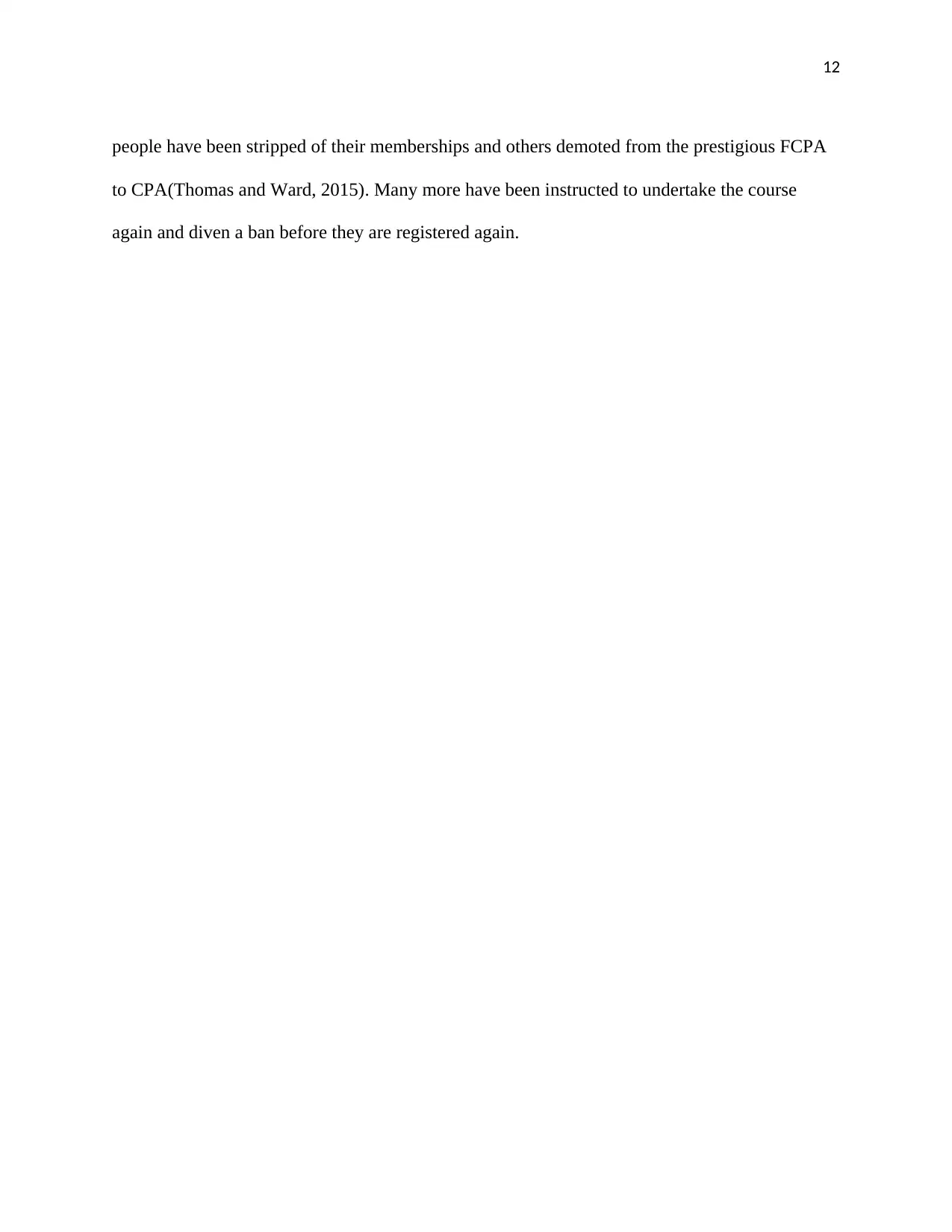
12
people have been stripped of their memberships and others demoted from the prestigious FCPA
to CPA(Thomas and Ward, 2015). Many more have been instructed to undertake the course
again and diven a ban before they are registered again.
people have been stripped of their memberships and others demoted from the prestigious FCPA
to CPA(Thomas and Ward, 2015). Many more have been instructed to undertake the course
again and diven a ban before they are registered again.
⊘ This is a preview!⊘
Do you want full access?
Subscribe today to unlock all pages.

Trusted by 1+ million students worldwide
1 out of 13
Related Documents
Your All-in-One AI-Powered Toolkit for Academic Success.
+13062052269
info@desklib.com
Available 24*7 on WhatsApp / Email
![[object Object]](/_next/static/media/star-bottom.7253800d.svg)
Unlock your academic potential
Copyright © 2020–2026 A2Z Services. All Rights Reserved. Developed and managed by ZUCOL.





